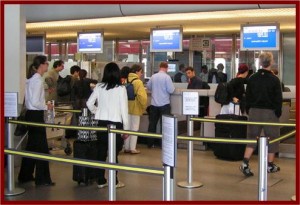
DOT is considering requiring that all optional fees be disclosed wherever consumers can book a flight.
New airline regulations going into effect on 26 January require airlines and ticket agents to include all mandatory taxes and fees in published airfares, and that they disclose baggage fees to consumers buying tickets.
At the moment commercial airlines are allowed to publish ads that list government-imposed taxes and fees separately from the advertised fare, as long as these taxes and fees are assessed on a per-passenger basis. Under the new requirements, all taxes and fees must be included together in the advertised fare.
Also beginning tomorrow, airline passengers will be able to hold a reservation without payment, or cancel a booking without penalty, for 24 hours after the reservation is made, if they make the reservation one week or more prior to a flight’s departure date.
In addition, airlines will be required to promptly notify passengers of flight delays of over 30 minutes, as well as flight cancellations and diversions, and they will generally be prohibited from increasing the price of passengers’ ticket after it is bought.
“Airline passengers have rights, and they should be able to expect fair and reasonable treatment when booking a trip and when they fly,” U.S. Transportation Secretary Ray LaHood said. “The new passenger protections taking effect this week are a continuation of our effort to help air travelers receive the respect they deserve.”
The new requirements are the last provisions to become effective from the Department’s most recent airline consumer rule published last April. A number of new measures required by the rule took effect on Aug. 23, 2011, including requirements that airlines refund baggage fees if bags are lost and provide increased compensation to passengers bumped from oversold flights.
Also beginning last August, the Department set a four-hour time limit on tarmac delays for all international flights at U.S. airports, and extended the three-hour tarmac delay limit for domestic flights to smaller airports. It also required additional airlines to report their lengthy tarmac delays to DOT.
The Department is looking at other airline consumer protection measures for a possible future rulemaking, including requiring that all airline optional fees be disclosed wherever consumers can book a flight, strengthening disclosure of code-share flights, and requiring additional carriers to file on-time performance reports.
See also:
- FAA Finally Alters Pilot Fatigue Rules after Colgan Air Deaths
- American Airlines Files for Bankruptcy – Pensions Threatened?
- American Fined $900,000 for Tarmac Delays at O’Hare Airport
- Biofuels Now in Commercial Use at United and Alaska Airlines
- DOT Fines Orbitz for Violating Price Advertising Rules
- Auto Industry Reputation Shows Big Gains as Airlines Crash
- House and Senate Finally Agree Not to Close FAA but Fail to Address Taxes for Aviation and Bankrupt Highway Trust Fund
- EPA Tightens Airplane Emissions Rules as U.S. Carriers Sue EU
- DOT adds Protections for Air Travelers Abused by Airlines
- Atlanta Airport TSA Employee Handcuffs, Rapes Woman


Hurray! for the DOT actions on behalf of the flying public. I spend plenty of time commuting by air and the experience has slowly, but steadily deteriorated to a point where root canals and flaming hemorrhoids are less stressful than flying.
The U.S. Department of Transportation (DOT) today fined Asiana Airlines, a carrier based in the Republic of Korea, and LOT Polish Airlines for violating federal aviation laws and the Department’s rules prohibiting deceptive price advertising in air travel. Asiana was fined $70,000 and LOT $60,000.
For a period of time during the fall of 2011, both carriers displayed ads on their websites that violated DOT’s rules. Asiana’s ads showed fares for various routes, with a link indicating that taxes, fees, and other restrictions could apply. The link took consumers to a page where taxes and fees were described in fine print at the bottom of the page, which was on a different screen. One of these additional fees was a fuel surcharge imposed by the carrier.
LOT displayed ads that did not provide any information about additional taxes and fees. Consumers who clicked on the fare were taken to a page containing sample routes and fares, as well as fine print explaining the type of taxes and fees on a separate screen reached only after scrolling to the bottom of the page.
DOT today also assessed a civil penalty of $80,000 against Alitalia, an airline based in Italy, for violating an international treaty by limiting reimbursement to passengers whose baggage was lost or delayed on Alitalia flights to and from the United States.
Following complaints filed with DOT by consumers, the Department’s Aviation Enforcement Office investigated Alitalia’s baggage policy. It found that for a number of flights to and from the United States, Alitalia was limiting reimbursements to between $50 and $75 per day of delay regardless of the amount of the expenses claimed by passengers or whether they provided original receipts documenting their expenses.
Alitalia’s policy violated a provision of the Montreal Convention, an international agreement setting rules for international air travel. The agreement says that carriers may not limit their liability for loss or damage to checked baggage to less than approximately $1,700 per person, an amount that fluctuates based on currency conversion rates.